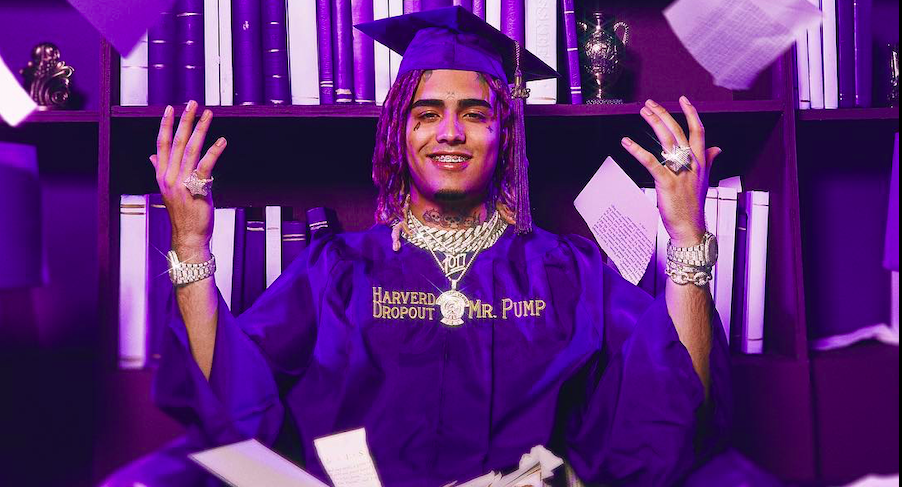Lil Pump does the same old thing on ‘Harverd Dropout’

Lil Pump
Harverd Dropout
Warner Bros. Records · February 22, 2019
At its worst, it is a repetitive and calculated project that shows no artistic growth from the 18-year-old Miami rapper.
On Friday, February 22nd, Lil Pump released his second studio album, Harverd Dropout. A follow up to his controversial, yet commercially successful eponymous debut album Lil Pump in 2017, this album is similar in length, with his first album running 15 tracks long at 36 minutes and Harverd Dropout at 16 songs totaling 40 minutes.
The album was originally supposed to come out on Pump’s 18th birthday in August 2018, but due to legal issues and “losing” part of the album, it was instead dropped nearly 6 months later. In anticipation of the album’s release, 7 singles were released roughly once a month starting from April 2018, including the dance-inducing club anthem “I Love It” featuring Kanye West, which peaked at #5 on the Billboard Hot 100.
One of the first things that immediately stands out to me on Harverd Dropout is the amount of high-profile superstar rap artists Lil Pump has enlisted to serve as guest features. In addition to West, artists such as Lil Wayne, Lil Uzi Vert, YG, 2 Chainz, Quavo, Offset and frequent collaborator and fellow Florida rapper Smokepurpp are found throughout the project.
Lyrically, the album is full of repetitive, simple lyrics addressing topics such as wealth, fame, drugs and women. Similar to his breakthrough hit “Gucci Gang,” the songs on Harverd Dropout rely on Pump’s high energy and fun trap beats to make up for the painfully simple lyrics that lack any deeper meaning.
The subject matter in most of Harverd Dropout’s songs is often so oversaturated with absurd comments and drug glorification that it seems almost comical. The album’s opening track “Drop Out” plays along with a popular internet meme that claims Lil Pump dropped out of Harvard to “save rap.” The lyrics on the track showcase Lil Pump bragging about things like smoking in the school bathroom, buying cars and having rivalries with school teachers. The production on the album is handled mainly by frequent Pump collaborators CBMix and Diablo, with additional production coming at the hands of Kanye West, Fizzle, Dee Money and Lil Pump himself.
Make no mistake, this album can be very fun; Lil Pump’s confidence soars higher than ever as he raps about making millions despite dropping out of school, doing drugs with his grandma and not being able to read. Pump has endless charisma and moments of legitimate chemistry with his collaborators (the 12th track off the album, “Be Like Me” featuring Lil Wayne, sees Lil Pump at arguably his most polished, sharing a track with one of rap’s heavyweight veterans). There is an undeniable catchiness to his lyrics that is almost hypnotic, and combined with the explosive bass-filled production, the album seems to dare you to creep in and take part of the fun, madness and recklessness. At it’s very best, Harverd Dropout reminds us how Lil Pump became a critical face in the modern, colorful hair SoundCloud rap generation. It shows us the woozy, wild world Lil Pump has created for himself, excelled in and shows no desire to leave. He’s young, rich, and at the peak of his powers. At its worst, it is a repetitive and calculated project that shows no artistic growth from the 18-year-old Miami rapper.
On Harverd Dropout, Lil Pump gains no new strengths, and exhausts his current ones to the point where most of the album seems unnecessary at its core. Lil Pump seems less of an artist than a meme whose goal is to push the boundaries of what is being played in mainstream clubs and radio stations (for example, when he raps about giving lean to a baby on “ION”). It is safe, basic and just edgy enough, right on par with Lil Pump’s entire appeal. In today’s digital age of music, artists have so many outlets to entertain fans in addition to their music and can connect with fanbases in personal, unprecedented ways. Lil Pump is the embodiment of this skill. With over 18 million followers on Instagram, he has a fanbase so strong it seems as though an album like this could be released every year and he would still make a ton from sales. On his sophomore project, Lil Pump shows he knows what he is all about, loves what he is all about, and doesn’t care that you don’t like what he is about. To some extent, it is admirable; on the other hand, it is incredibly irritating.